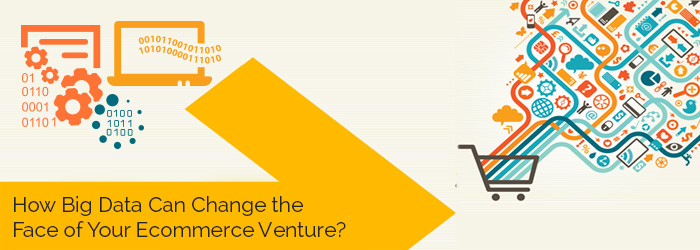How Big Data Can Change the Face of Your Ecommerce Venture

When John’s Kindle developed a glitch he called up Amazon for a service request. To his surprise, he got a response in less than 20 seconds, and it took the person less than a couple of minutes to resolve the issue. What particularly surprised him was the personal level of interaction laced with some unusual warmth and at the end of which he did not have to state his name and address. The experience was pleasant enough to restore his confidence in customer support services. It was evident that Amazon had made data about John — something it has been collecting ever since john first came to their site — available to the agent. The complaint call served as an opportunity for Amazon to create a brand defining moment for the company.
It was way back in early 2000, that Amazon realized that they had enormous data about their users which can be tapped for better use. The company thought of using the data to improve its relationship with its customers as well as cross sell and up sell products. The led to the big data revolution which took Amazon’s business to new and dizzying heights.
Taking a leaf out of Amazon’s success, many eCommerce companies have started capturing and analyzing the exploding data to drive innovation, productivity growth, and fuel sales.
CVS, the second-largest online pharmacist store in the US used big data analysis to discover that one-third of patients discontinued taking prescribed medicine within a month, and nearly half of them gave it up after a year. Based on these insights, the company initiated an automated program to remind people through messages and emails to refill their prescriptions.
Dollar General, a US based online seller of diverse products, thought that if suppliers enter into an alliance to promote their respective products, it would help them push each other’s sales. So the company leveraged big data to make it possible for suppliers to examine real time operational and retail data. The suppliers could now see what other products customers bought along with their products. Armed with this insight, suppliers could tailor cross-promotional agreements with other suppliers to mutually benefit both parties.
Similarly, Macy’s, the online fashion store, tapped into Big Data to create specific product range for segmented customers. By analyzing a host of factors and correlating these with SKU data the company optimized local products to particular customer segments in specific locations.
All these examples point to the fact that to create competitiveness and value, it’s a must for your eCommerce venture to take big data seriously. Big data services can help your start-up collect more accurate and detailed information on everything; use the information for better management decisions; experiment with new ideas; tailor products with greater precision; develop the next generation of products and build lasting relationships with customers.
Despite the huge benefits, the very thought of big data can cause eCommerce start-ups to get overwhelmed. The challenge therefore lies in convincing yourself that big data is not too big for your organization. Remember, big data is just not about the way you correlate and analyze data. In fact it is more about how you use the upshot to bring your vision and acumen to the fore.
So, if you are visionary, big data will help you bring a revolution with your eCommerce start-up.
